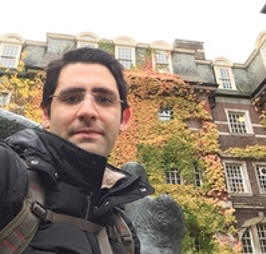Vortrag
 |
Dr. Mohammad Javad Ahmadian (School of Education, University of Leeds, UK) A talk for the ↗︎ Virtual Laboratory Forthcoming pre-recorded lecture |
Abstract
(forthcoming)
Bio
↗︎ Dr. Mohammad Ahmadian is one of the most brilliant linguists of the new generation specializing in instructed L2 acquisition and task-based language teaching and learning. He joined the School of Education at the University of Leeds in 2015 as a Lecturer in TESOL and before that he spent 7 years at the University of Isfahan (Iran) as a part-time lecturer, teaching fellow, and assistant professor of applied linguistics. Dr. Ahmadian currently has a range of teaching, supervision, and leadership responsibilities. Besides his numerous publications, in 2016 he guest-edited ↗︎ The Language Learning Journal’s special issue on Task-based Language Teaching and Learning, and in 2018 he co-edited the volume ↗︎ Recent Perspectives on Task-based Language Learning and Teaching (De Gruyter Mouton). Dr. Ahmadian’s research interests are focused on planning and repetition in task design and task sequencing, the relationship between working memory capacity and various task factors and instructional conditions, learners' and teachers' perceptions of task-based language teaching, complexity, accuracy, and fluency in L2 speech, self-repair behavior and speech production processes, and quantitative and qualitative research design and analysis.
Recommended literature
(see more complete lists of Dr. Ahmadian’s publications ↗︎ here and ↗︎ here)
Ahmadian, M.J. & Long, M. (2021, in press). The Cambridge Handbook of Task-Based Language Teaching. Cambridge University Press.
Ahmadian, M.J. (2020). ↗︎ Explicit and Implicit Instruction of Refusal Strategies: Does Working Memory Capacity Play a Role? Language Teaching Research. 24(2), 163–188.
Wen, E., Ahmadian, M.J. (2019). Researching L2 Task Performance and Pedagogy. In Honour of Peter Skehan. John Benjamins.
Bui G., Ahmadian M.J., & Hunter, A-M. (2019). ↗︎ Spacing effects on repeated L2 task performance. System 81, 1–13.
Ahmadian M.J. & García Mayo M.P (Eds.) (2018). ↗︎ Recent Perspectives on Task-based Language Learning and Teaching. Trends in Applied Linguistics. De Gruyter Mouton.
Ahmadian, M.J., Mansouri A., Ghominejad S. (2017). ↗︎ Language learners' and teachers' perceptions of task repetition. ELT Journal, 71(4), 467–477.
Ahmadian M.J. (2016). ↗︎ Task-based language teaching and learning. The Language Learning Journal 44(4), 377–380.
Ahmadian, M.J. (2015). ↗︎ Working Memory, Online Planning and L2 Self-Repair Behaviour. In: Wen, Z., Mota Borges, M., McNeil, M.A. (Eds.). Working Memory in Second Language Acquisition and Processing. Second Language Acquisition. 160–174. ). Multilingual Matters: Bristol, Buffalo, Toronto.
Mojavezi, A. & Ahmadian, M.J. (2014). ↗︎ Working memory capacity and self-repair behavior in first and second language oral production. Journal of Psycholinguistic Research, 43, 289–297.
Ahmadian, M.J. (2012). ↗︎ Task repetition in ELT. ELT Journal 66(3), 380–382.
Ahmadian M.J. (2012). ↗︎ The effects of guided careful online planning on complexity, accuracy and fluency in intermediate EFL learners’ oral production: The case of English articles. Language Teaching Research 16(1), 129–149.
Ahmadian M.J. (2011). ↗︎ The effect of ‘massed ’task repetitions on complexity, accuracy and fluency: does it transfer to a new task? Language Learning Journal, 39(3), 269–280.
Ahmadian M.J., & Tavkoli, M. (2011). ↗︎ The effects of simultaneous use of careful online planning and task repetition on accuracy, complexity, and fluency in EFL learners’ oral production. Language Teaching Research 15 (1), 35–59.
|
The project aims to popularize and promote cognitive and neurocognitive sciences data The Virtual Laboratory (a MOOC-like resource) constitutes an open collection The recorded videoconferences will be available at the webspace ↗︎ Detailed project description If you are interested in presenting a talk within the Virtual Laboratory, |
|



